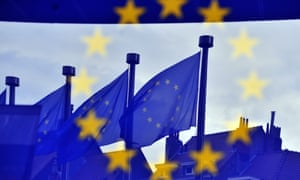New European data protection rules would see companies require parental consent to handle data of those under 16, effectively blocking them from social media
 Teenagers in Europe could be blocked from using Facebook, Whatsapp and other internet services and social media should European data protection laws that increase the age of consent to 16 be pushed through. Photograph: Georges Gobet/AFP/Getty Images
Teenagers in Europe could be blocked from using Facebook, Whatsapp and other internet services and social media should European data protection laws that increase the age of consent to 16 be pushed through. Photograph: Georges Gobet/AFP/Getty Images The European Parliament is set to vote on Tuesday on new rules that could see teenagers banned from internet services such as Facebook, social media, messaging services or anything that processes their data, without explicit consent from their parent or guardian.
The last-minute amendment to the new European data protection regulations would make it illegal for companies to handle the data of anyone aged 15 or younger, raising the legal age of digital consent to 16 from 13.
Companies wishing to allow those under 16 to use their services, including Facebook, Snapchat, Whatsapp and Instagram, will have to gain explicit consent from their legal guardian.
The draft law states: "The processing of personal data of a child below the age of 16 years shall only be lawful if and to the extent that such consent is given or authorised by the holder of parental responsibility over the child."
Companies such as Facebook currently allow users from the age of 13 to join their services. Their policies are based on the age of digital consent being 13, as defined by the US Children's Online Privacy Protection Act (Coppa) and similar laws in the EU, which afford those under 13 extra privacy protections.
Until recently, the draft European data protection bill, which is four years in the making, set the digital age of consent at 13, mirroring Coppa.Experts against the change
The changes are equally opposed by technology companies and child-safety experts, who warned that the increased age of consent would make it very difficult for teenagers under 16 to use social media and other internet-based resources and services.
Janice Richardson, former coordinator of European Safer Internet network, and consultant to the United Nations' information technology body, the ITU and the Council of Europe said: "Moving the age from 13 to 16 represents a major shift in policy on which it seems there has been no public consultation.
"We feel that moving the requirement for parental consent from age 13 to age 16 would deprive young people of educational and social opportunities in a number of ways, yet would provide no more (and likely even less) protection."
Larry Magid, chief executive of ConnectSafely.org, said: "It will have the impact of banning a very significant percentage of youth and especially the most vulnerable ones who will be unable to obtain parental consent for a variety of reasons."
Not the first time those under 17 have been barred
The changes would legally stop teenagers from accessing social media, among other internet services, unless a parent or guardian consents, but it will likely not stop them from accessing the services.
Facebook required users to be 17 or older before 2006, when it was opened up to the public, but that did not stop teenagers from signing up. Most social media accounts request dates of birth on setting up accounts, but have no way to verify the information.
Unlike those adults signing up to over-18 services, such as adult entertainment sites, which often use a credit card as part of age verification, teenagers under 17 do not have verifiable age-based identification.
For the technology companies the biggest issue with the new rules would be policing them. Stopping teenagers under 16 from accessing messaging, social media and other sites would be very difficult. European legislators are no doubt under intense lobbying pressure to remove the age of consent change from the draft.
US technology firms, including Facebook and Google, have faced an increasingly tough European landscape over the recent years, coming under intense scrutiny over privacy and taxation practices.
The new... ( more at http://www.theguardian.com/technology/2015/dec/15/europe-ban-teenagers-facebook-internet-data-protection-under-16 )- DOWNLOAD PARCIAL. LARCEN, César Gonçalves. Mais uma lacônica viagem no tempo e no espaço: explorando o ciberespaço e liquefazendo fronteiras entre o moderno e o pós-moderno atravessando o campo dos Estudos Culturais. Porto Alegre: César Gonçalves Larcen Editor, 2011. 144 p. il.
- DOWNLOAD GRATUÍTO. FREE DOWNLOAD. AGUIAR, Vitor Hugo Berenhauser de. As regras do Truco Cego. Porto Alegre: César Gonçalves Larcen Editor, 2012. 58 p. il.
- DOWNLOAD GRATUÍTO. FREE DOWNLOAD. LINCK, Ricardo Ramos. LORENZI, Fabiana. Clusterização: utilizando Inteligência Artificial para agrupar pessoas. Porto Alegre: César Gonçalves Larcen Editor, 2013. 120p. il.
- DOWNLOAD GRATUÍTO. FREE DOWNLOAD. LARCEN, César Gonçalves. Pedagogias Culturais: dos estudos de mídia tradicionais ao estudo do ciberespaço em investigações no âmbito dos Estudos Culturais e da Educação. Porto Alegre: César Gonçalves Larcen Editor, 2013. 120 p.
- LARCEN, César Gonçalves. Mais uma lacônica viagem no tempo e no espaço: explorando o ciberespaço e liquefazendo fronteiras entre o moderno e o pós-moderno atravessando o campo dos Estudos Culturais [ebook]. / César Gonçalves Larcen - 2. Ed. - Canoas: César Gonçalves Larcen Editor, 2014. 102 p. ebook.: il. COMPRE AQUI: https://agbook.com.br/book/175936--MAIS_UMA_LACONICA_VIAGEM_NO_TEMPO_E_NO_ESPACO
- CALLONI, H.; LARCEN, C. G. From modern chess to liquid games: an approach based on the cultural studies field to study the modern and the post-modern education on punctual elements. CRIAR EDUCAÇÃO Revista do Programa de Pós-Graduação em Educação UNESC, v. 3, p. 1-19, 2014.
http://periodicos.unesc.net/index.php/criaredu/article/view/1437





Nenhum comentário:
Postar um comentário